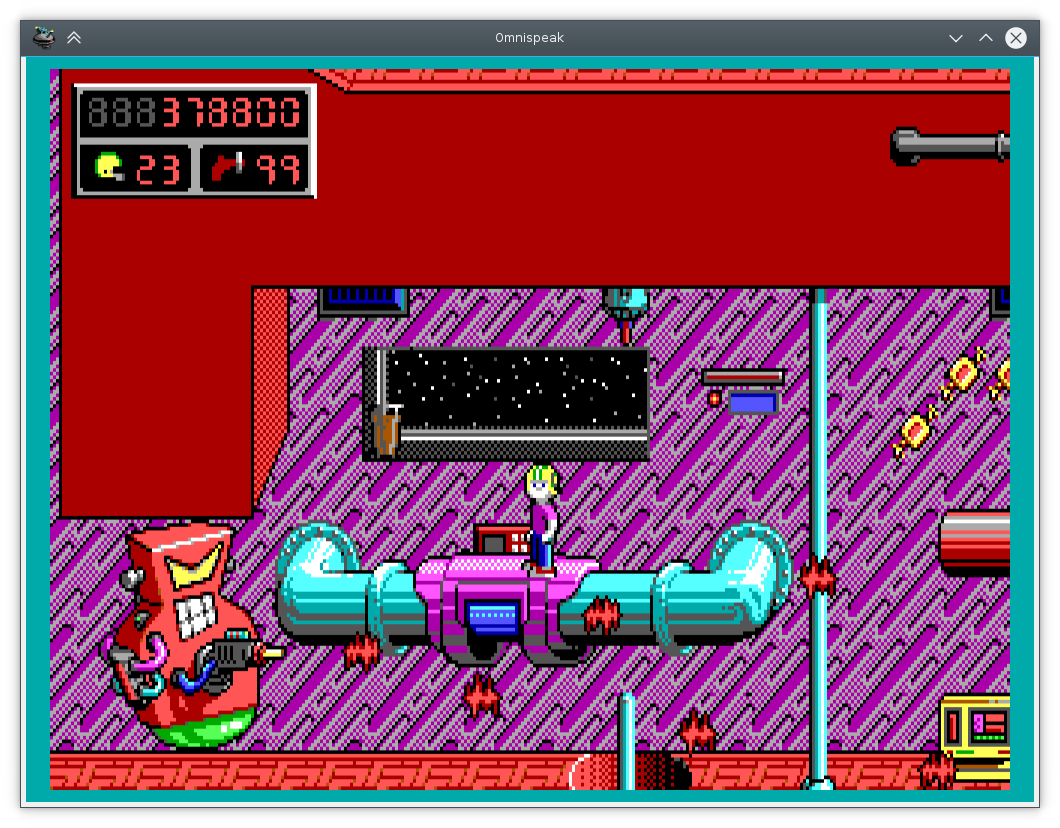What is it?

Omnispeak is an open-source reimplementation of Commander Keen episodes 4, 5,
and 6. It aims to be a pixel-perfect, bug-for-bug clone of the original games,
and is compatible with savegames from the DOS version.
It's written in modern C99/C++, is compatible with both Windows and Linux,
and is easy to port to other platforms.
Omnispeak also includes several new features, including:
- Improved graphics scaling and compatibility support.
- Dramatically improved joystick/gamepad support.
- QuickLoad and QuickSave support (F5 and F9 by default)
- Support for real AdLib / OPL2 compatible sound cards on Linux and MS-DOS
- Support for the OPL2LPT (requires libieee1284 and a custom build option)
The complete source code to Omnispeak is available on GitHub: https://github.com/sulix/omnispeak.
Get it!

You can download for:
Or, you can download the preview version (with basic modding support) here
(Windows, Linux, 32-bit MS-DOS/DJGPP). See more details on PCKF or on GitHub.
There are also several ports to other operating systems, with varying levels of support and completeness:
To play, you'll need to include files from the original game.
Omnispeak supports only these versions:
These should be the easiest versions to get. For example, the
Steam version and
the GOG version
are both version 1.4. Keen 6 is not easily available, but
you should be able to find patches which convert one version of the game to
another. Keen 6 v1.5 fixes a few bugs, so it's probably best to use it if you
can.
You'll need to take the following files from your version of Keen, and place
them in the same directory as the 'omnispeak' binary:
- GAMEMAPS.CK?
- EGAGRAPH.CK?
- AUDIO.CK?
You'll also need the files from the 'data' directory corresponding to your
version of Keen.
To run the game, simply switch to the directory with the data files, and run:
./omnispeak
Configuration Options

Omnispeak introduces several extra configuration options which the original Keen games did not have.
Many of these can be configured from the game's Configure→Options menu, including
- Fullscreen: Run the game in full-screen mode, rather than in a window.
- Correct Aspect Ratio: Enforce a 4:3 aspect ratio to match the original VGA display.
- Overscan Border: Emulate the cyan VGA overscan border.
- Integer Scaling: Scale to the nearest integer multiple of the original 320×200 resolution. This option often conflicts with the Correct Aspect Ratio option.
- VSync: Synchronise the game's display to the vertical blank. Note that, due to the VGA 320×200 resolution operating at 70Hz, turning this on will likely result in stutter, but may aleviate tearing artefacts on some systems.
In addition, some more keybinding options are available in the Keyboard menu, and the new Joystick Options menu provides additional configuration options,
including remappable buttons and the new Modern mode, which greatly improves diagonal movement.
Many extra options can also be set by modifying the OMNISPK.CFG file, which accepts a number of options. For example:
# Reduce this to make the game load as fast as possible.
loadingDelay = 10
# Set this to 'false' to disable the Impossible Bullet glitch in Keen 6
impossibleBullet = true
# Change which OPL2 emulator is used. Valid values are "dbopl" and "nukedopl3".
oplEmulator = "nukedopl3"
# Force the game to support the joystick in menus, even if it isn't the enabled input device
in_forceJoyMenu = true
# Disable the Keen 6 copy protection question
ck6_noCreatureQuestion = true
# Audio sample rate (Setting this to 44100 or 48000 may increase compatibility).
sampleRate = 49716
# What sound backend to use: "default", "alsa" (OPL2 harware on Linux), "opl2lpt"
sd_backend = "default"
# Linux ALSA opl2 only: name of ALSA hwdep device
sd_alsa_device = "hw:0,0"
# Linux OPL2LPT only: name of parallel port used
sd_opl2lpt_port = "parport0"
Omnispeak also supports a number of command-line arguments. These are some of the most useful:
/EPISODE <4,5,6,6v14,6v15>- Runs the given episode/version of Commander Keen
/GAMEPATH <directory>- Sets the path to the game data files.
/USERPATH <directory>- Sets the path to the savegame and config files.
/NOJOYS- Disables Joystick detection.
/DEMOFILE <filename>- Plays the demo recorded with Keen's
F10+D cheat in filename.


